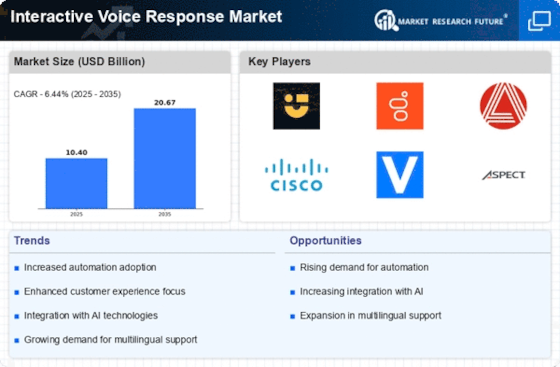Market Share
Interactive Voice Response Market Share Analysis
The Interactive Voice Response (IVR) market is shaped by a myriad of market factors that collectively influence its growth and trajectory. One of the key driving forces is the escalating demand for streamlined and efficient customer service solutions across various industries. As businesses strive to enhance their customer interactions, IVR systems emerge as a pivotal tool, automating and optimizing communication processes. This surge in demand is further fueled by the increasing awareness among enterprises regarding the cost-effectiveness and productivity gains associated with IVR implementation.
Moreover, technological advancements play a pivotal role in shaping the IVR market landscape. The constant evolution of artificial intelligence (AI) and natural language processing (NLP) technologies has empowered IVR systems to offer more sophisticated and personalized interactions. This not only improves customer satisfaction but also enables businesses to gather valuable insights into customer preferences and behaviors.
Additionally, the global trend towards digital transformation has significantly contributed to the growth of the IVR market. With businesses increasingly adopting cloud-based solutions, IVR systems have become more accessible and scalable. Cloud-based IVR solutions offer flexibility, allowing companies to adapt to changing business needs without the constraints of traditional on-premise systems. This scalability is particularly attractive for small and medium-sized enterprises (SMEs) looking to leverage advanced communication technologies without significant upfront investments.
The competitive landscape is another vital factor influencing the IVR market. As the number of solution providers continues to rise, competition intensifies, prompting companies to innovate and differentiate their offerings. This competitive environment benefits end-users as it drives continuous improvements in IVR technology, leading to more feature-rich and user-friendly solutions.
Government regulations and compliance requirements also play a crucial role in shaping the IVR market. As data privacy and security concerns become increasingly prominent, businesses must ensure that their IVR systems adhere to regulatory standards. This has led to the development of secure and compliant IVR solutions, addressing the growing need for data protection in customer interactions.
Furthermore, changing consumer preferences and behaviors contribute to the dynamic nature of the IVR market. Today's customers expect seamless and personalized experiences across all touchpoints, and IVR systems are instrumental in meeting these expectations. Companies that can adapt their IVR solutions to align with evolving consumer preferences gain a competitive advantage in the market.
Economic factors, such as overall market conditions and budget constraints, also impact the adoption of IVR systems. During periods of economic uncertainty, businesses may prioritize cost-effective solutions that enhance operational efficiency, driving the demand for IVR technology.


















Leave a Comment